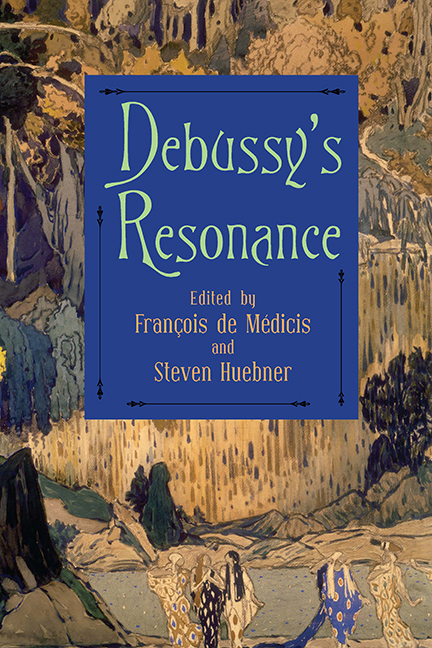Book contents
- Frontmatter
- Contents
- List of Illustrations
- Acknowledgments
- List of Abbreviations
- Introduction
- Part One Historiographical and Editorial Issues
- Part Two Style and Genre
- Part Three History and Hermeneutics
- Part Four Theoretical Issues
- Part Five Performance and Reception
- 18 Debussy and Late-Romantic Performing Practices: The Piano Rolls of 1912
- 19 Marius-François Gaillard's Debussy: Controversies and Pianistic Legacy
- 20 Fashioning Early Debussy in Interwar France
- List of Contributors
- Index
19 - Marius-François Gaillard's Debussy: Controversies and Pianistic Legacy
from Part Five - Performance and Reception
Published online by Cambridge University Press: 27 July 2019
- Frontmatter
- Contents
- List of Illustrations
- Acknowledgments
- List of Abbreviations
- Introduction
- Part One Historiographical and Editorial Issues
- Part Two Style and Genre
- Part Three History and Hermeneutics
- Part Four Theoretical Issues
- Part Five Performance and Reception
- 18 Debussy and Late-Romantic Performing Practices: The Piano Rolls of 1912
- 19 Marius-François Gaillard's Debussy: Controversies and Pianistic Legacy
- 20 Fashioning Early Debussy in Interwar France
- List of Contributors
- Index
Summary
A prominent figure in the Parisian musical milieu during the interwar years, Marius-François Gaillard (1900–73) achieved considerable success as both a pianist and a conductor, while his compositional activities were recognized by René Dumesnil in La musique en France entre les deux guerres 1919–1939, where he was acknowledged as among the most notable French composers of his generation. Yet Gaillard has since been relegated to little more than a footnote in French music of the period, despite making an important contribution to Parisian musical life and leaving a significant Debussyan legacy. In addition to promoting new music of the age through founding an orchestra and concert series bearing his name for which he conducted many works by his contemporaries, including the Paris première of Varèse's Intégrales (revised version), Gaillard became the first pianist to perform the (then) complete works of Debussy in public in 1920. This remarkable feat, which is at least as historically important as Alfred Cortot's more often cited première of Debussy's Fantaisie in December 1919, has received little attention, Debussy scholars remembering Gaillard more for the controversies surrounding his completion of the composer's unfinished cantata Ode à la France. Repeating his Debussy cycles several times in both Paris and South America, Gaillard subsequently made the largest collection of commercial recordings of Debussy's piano works by any individual pianist up to 1930.
So how did a figure of such ability and versatility fade into obscurity? Did Gaillard diversify his musical activities too widely? Did the Debussyan controversies that dogged his early career result in professional alienation, or were there other reasons for the rapid decline of his career after the Second World War? This essay will address these questions while exploring Gaillard's credentials as a viable Debussyste, and propose that the quality of his achievements as a performer merits his reinstatement in the pantheon of great twentiethcentury French pianists.
Gaillard first established his name as a pianist. He studied at the Paris Conservatoire with the redoubtable Louis Diémer as well as with Georges Falkenberg, and thus descended from a distinguished French pianistic tradition, the genealogy of which merits scrutiny. Diémer had been a pupil of that pillar of the late nineteenth-century pianistic establishment at the Paris Conservatoire, Antoine-François Marmontel, who studied with one of the most influential teachers of the first half of the nineteenth century, Pierre Zimmerman.
- Type
- Chapter
- Information
- Debussy's Resonance , pp. 562 - 580Publisher: Boydell & BrewerPrint publication year: 2018



